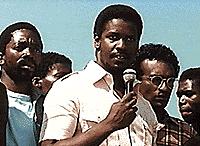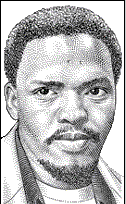He was the founder of South Africa's
Black Consciousness Movement. His death from head injuries
suffered while in police custody made him an international martyr for
South African black nationalism.
After being expelled from high school for political activism, Biko
managed to enroll in and graduate (1966) from St. Francis College, a
liberal boarding school in Natal, and then entered the University of
Natal Medical School. There he became involved in the multiracial
National Union of South African Students (NUSAS), a moderate
organization that had long espoused the rights of blacks. Growing
disenchanted with NUSAS, in which he claimed that "the whites [were]
doing all the talking and the blacks listening," he became in 1968
cofounder and first president of the all-black South African Students'
Organization (SASO), whose aim was to raise black consciousness and
black self-esteem and "to overcome the psychological oppression of
blacks by whites." In the 1970s the Black Consciousness Movement
spread from university campuses into urban black communities
throughout South Africa.
Biko's black activism eventually drew official censure when he and
other SASO members were served with "banning" orders in February 1973,
tightly restricting their associations, movements, and public
statements. Biko then operated covertly, establishing the Zimele Trust
Fund in 1975 to help political prisoners and their families. He was
arrested four times over the next two years and was held without trial
for months at a time. On Aug. 18, 1977, he and a fellow activist were
seized at a roadblock and jailed in Port Elizabeth. Not formally charged
with any specific crime, Biko was arrested under Section 6 of the Terrorism
Act. This Act allowed for the indefinite detention, for the purposes of
interrogation, of any person suspected to be a terrorist, or to be in
possession of information regarding activities of terrorists. Twenty-six
days after his arrest, Biko died in prison from massive head injuries.
Although it will never be known exactly what happened to Biko from the time
he was arrested up until the day of his death, there is enough evidence to
incriminate the presiding district surgeons of unethical conduct.
On September 7, 1977, the leader of the daytime interrogation team, Major
Snyman, reported to Colonel Goosen on detainee Stephen Bantu Biko's
condition, stating that Biko was refusing to react to questions and was
acting strangely. Early that morning a Port Elizabeth district surgeon, Dr.
Ivor Lang, was called by Colonel Goosen, head of the security police in the
Eastern Cape, to examine Biko for a suspected stroke. By WMA guidelines, the
doctor has the right to examine the detainee in private, without the presence
of a security officer. Nevertheless, Dr. Lang examined Biko under the watchful
eye of Colonel Goosen. Biko was moved from his cell into a policeman's office
at security headquarters, placed on a mat, and shackled to a metal grill.
Dr. Lang found that the patient,
-
... was walking with an ataxic gait (an inability to coordinate
voluntary muscular movements which can be a symptom of a nervous
disorder); spoke in a slurred manner; and, was suffering from: a
laceration on the upper lip; a superficial bruise over the sternum
at the level of the second rib; ring marks around each wrist; the
swelling of both hands, feet, and ankles.
Yet when summoned by Colonel Goosen for a medical certificate, Dr. Lang
reported:
-
This is to certify that I have examined Stephen Biko as a result of
a request from Colonel Goosen of the security police who complained
that the above-mentioned would not speak. I have found no evidence
of any abnormality or pathology on the patient.
The following day Dr. Lang's presence was again requested along with that
of his superior, Dr. Benjamin Tucker, the chief district surgeon for Port
Elizabeth. Biko, still manacled to the metal grille, and on the same mat
now soaked with urine, was once again examined. Dr. Tucker observed a
possible extensor plantar reflex in the detainee, and concluded that this
symptom of nervous system malfunction could possibly be the result of brain
damage. Further examination was requested and on September 9 a specialist
at the Sydenham Prison Hospital, Dr. Hersch, performed a lumbar puncture
which revealed bloodstaining in the cerebrospinal fluid. A neurosurgeon,
Dr. Keely, was consulted and advised Dr. Lang to keep Biko under close
observation.
Due to the fact that the prison hospital lacked observation facilities, Dr.
Lang arranged for Biko to be relocated to the Walmer police station cells.
Dr. Lang recorded in his medical record:
-
No change in condition. Have informed him [Biko] that Dr. Hersch
and myself find no pathology, that lumbar puncture was normal, and
as a result, I was returning him to the police cells.
Once again, Biko was left lying on a mat on a cement floor and the only
attention he received was the occasional glance from a police warden. On
September 11 Colonel Goosen once again had Dr. Tucker visit the detainee.
Tucker found Biko to be unresponsive, frothing at the mouth, glossy-eyed,
and hyperventilating. Dr. Tucker recommended that Biko be transferred to a
provincial hospital in Port Elizabeth, but Colonel Goosen refused to allow
this for security reasons. Surrendering to the wishes of the security police,
Tucker gave his permission for Biko to be transferred by motor vehicle 750
miles to the Pretoria Central Prison.
Biko, semi-comatose, naked, and handcuffed, was put in the back of a Land
Rover and driven unaccompanied by any medical personnel, and without any
record of his medical history, to the Pretoria Central Prison. There, many
hours after his arrival, he was examined by district surgeon Dr. A. Van
Zyl, who had been summoned because the detainee was refusing to eat. An
intravenous drip, accompanied by a vitamin injection, was administered but on
September 12, 1977, Stephen Bantu Biko died on the floor of his cell,
unattended. A post mortem revealed massive brain damage and hemorrhage.
Biko's death provoked extreme outrage both within South Africa, and around
the world. The South African regime was already under international scrutiny
because of the Soweto uprising in 1976, just one year before Biko's death.
International outrage with the regime's repressive nature increased as the
details of Biko's death came to light. Then Justice Minister of South
Africa, Jimmy Kruger, announced that Biko had died because of a hunger
strike. He asserted that the district surgeons and police believed Biko
had been "feigning illness" and was therefore taken by Land Rover to
Pretoria without medical supervision. However, the autopsy revealed the
cause of death as a blow (or blows) to the head, struck with enough force
to render Biko unconscious.
The widespread anger generated by Biko's death, resulted in an inquest to
examine the conduct and medical negligence of the doctors involved. During
this inquest, one of the doctors admitted that "he didn't know that in this
particular situation one could override the decisions made by a responsible
police officer." Furthermore, during the inquest, the doctors admitted to
clinical errors and the falsification of reports. Dr. Lang conceded that he
wrote an inaccurate medical certificate at the request of Colonel Goosen of
the security police.
After a year long judicial inquest, it was found that no particular person
could be blamed for Biko's death and the case was submitted to the South
African Medical and Dental Council (SAMDC) for further investigation. In 1982,
after three years of procrastination, the SAMDC found the doctors not guilty
of unprofessional conduct, a decision supported by the Medical Association
of South Africa (MASA). There was furious protest both from within and
without South Africa, but no further action was taken against the doctors
involved. The MASA concluded that:
-
On evidence available, the Executive Committee felt that the
doctors who treated Mr. Biko had exercised reasonable skill and
care and were not guilty of negligence, while no proof of improper
or disgraceful conduct had been submitted.
In the aftermath of this scandal, the legitimacy and agenda of the MASA began
to be doubted. The dissatisfaction of many doctors with the actions and
decisions taken by the MASA, especially as pertained to the issue of the
health and welfare of detainees under security legislation, contributed to
the rise of an alternative organization, The National Medical and Dental
Association (NAMDA). NAMDA felt that the MASA was too closely aligned with
the apartheid state. Nevertheless, as late at 1984, 80 percent of actively
practising doctors were still members of MASA.
The public outcry over the torture, murder, coverup, and injustices done to
Biko, caused an international scandal that helped focus the world on the
Apartheid policies of the South African government. This and other episodes
started the embargos of talent (SunCity), technology, and business from
many nations.
We should never forget the inhumanity that we are capable of, and that we must
never let those who do, escape from the eye of the world.

